
The Quarrymen are a British skiffle/rock and roll group, formed by John Lennon in Liverpool in 1956, which evolved into the Beatles in 1960. Originally consisting of Lennon and several schoolfriends, the Quarrymen took their name from a line in the school song of their school, the Quarry Bank High School. Lennon's mother, Julia, taught her son to play the banjo, showed Lennon and Eric Griffiths how to tune their guitars in a similar way to the banjo, and taught them simple chords and songs.

"Get Back" is a song recorded by the British rock band the Beatles and Billy Preston, and written by Paul McCartney though credited to the Lennon–McCartney partnership. It was originally released as a single on 11 April 1969 and credited to "The Beatles with Billy Preston". The album version of this song contains a different mix that features a studio chat between Paul McCartney and John Lennon at the beginning which lasts for 20 seconds before the song begins, also omitting the coda featured in the single version. This version became the closing track of Let It Be (1970), which was released just after the group split up. The single version was later issued on the compilation albums 1967–1970, 20 Greatest Hits, Past Masters, and 1.
The Beatles' bootleg recordings are recordings of performances by the Beatles that have attained some level of public circulation without being available as a legal release. The term most often refers to audio recordings, but also includes video performances. Starting with vinyl releases in the 1970s, through CD issues in the late 1980s, and continuing with digital downloads starting in the mid 1990s, the Beatles have been, and continue to be, among the most bootlegged artists.

Anthology 1 is a compilation album by the Beatles, released on 20 November 1995 by Apple Records as part of The Beatles Anthology series. It features rarities, outtakes and live performances from the period 1958–64, including songs with original bass player Stuart Sutcliffe and drummer Pete Best. It is the first in a trilogy of albums with Anthology 2 and Anthology 3, all of which tie in with the televised special The Beatles Anthology. It contains "Free as a Bird", the first new Beatles song in 25 years, which was released as a single two weeks after Anthology 1.
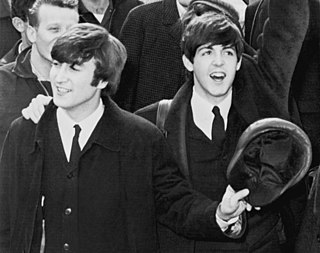
Lennon–McCartney was the songwriting partnership between English musicians John Lennon (1940–1980) and Paul McCartney of the Beatles. It is the best-known and most successful musical collaboration ever by records sold, with the Beatles selling over 600 million records worldwide as of 2004. Between 5 October 1962 and 8 May 1970, the partnership published approximately 180 jointly credited songs, of which the vast majority were recorded by the Beatles, forming the bulk of their catalogue.

"All Shook Up" is a song recorded by Elvis Presley, published by Elvis Presley Music, and composed by Otis Blackwell. The single topped the U.S. Billboard Top 100 on April 13, 1957, staying there for eight weeks. It also topped the Billboard R&B chart for four weeks, becoming Presley's second single to do so, and peaked at No. 1 on the country chart as well. It is certified 2× platinum by the Recording Industry Association of America.
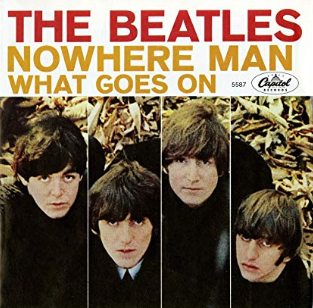
"Nowhere Man" is a song by the English rock band the Beatles. It was released in December 1965 on their album Rubber Soul, except in the United States and Canada, where it was first issued as a single A-side in February 1966 before appearing on the album Yesterday and Today. The song was written by John Lennon and credited to the Lennon–McCartney partnership. In the US, the single peaked at number 3 on the Billboard Hot 100 and number 1 on the chart compiled by Record World magazine, as it did the RPM 100 chart in Canada and in Australia. The song was also released as a single in some countries where it had been included on Rubber Soul, including Australia, where it topped the singles chart.

"Birthday" is a song by the English rock band the Beatles from their 1968 double album The Beatles. Written by John Lennon and Paul McCartney, mainly by McCartney, it is the opening track on the third side of the LP. Surviving Beatles Paul McCartney and Ringo Starr performed it for Starr's 70th birthday at Radio City Music Hall on 7 July 2010.
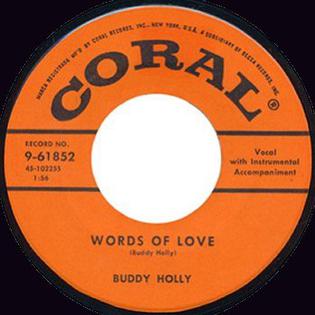
"Words of Love" is a song written by Buddy Holly and released as a single in 1957.
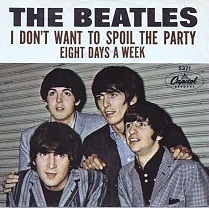
"I Don't Want to Spoil the Party" is a song by the English rock band the Beatles, written by John Lennon and credited to Lennon–McCartney. It was released on the album Beatles for Sale in the United Kingdom in December 1964. "I Don't Want to Spoil the Party" was also released on the Beatles for Sale EP.
"Till There Was You" is a show tune written in 1950 by Meredith Willson, originally entitled "Till I Met You." It was originally recorded October 25, 1950, by Meredith Willson & his Orchestra and Eileen Wilson. The song was retitled and used in his musical play The Music Man (1957), and also appeared in the 1962 movie version. It is sung by librarian Marian Paroo to "Professor" Harold Hill toward the end of Act Two.

"Ask Me Why" is a song by the English rock band the Beatles originally released in the United Kingdom as the B-side of their single "Please Please Me". It was also included on their 1963 debut album Please Please Me. It was written primarily by John Lennon and credited to the Lennon–McCartney partnership.

"In Spite of All the Danger" is the first song recorded by the Quarrymen, then consisting of John Lennon, Paul McCartney, George Harrison, pianist John Lowe, and drummer Colin Hanton.
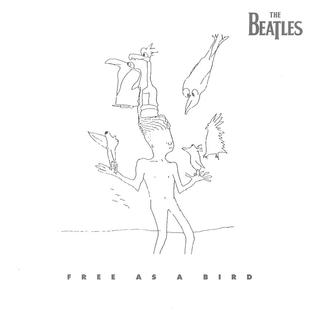
"Free as a Bird" is a single released in December 1995 by the Beatles. The song was originally written and recorded in 1977 as a home demo by John Lennon. In 1995, 25 years after their break-up and 15 years after Lennon's murder, his then surviving bandmates Paul McCartney, George Harrison and Ringo Starr released a studio version incorporating the demo.
"Come Go With Me" is a song written by C. E. Quick, an original member of the American doo-wop vocal group the Del-Vikings. The song was originally recorded by The Del-Vikings in 1956 but not released until July 1957 on the Luniverse LP "Come Go With The Del Vikings".
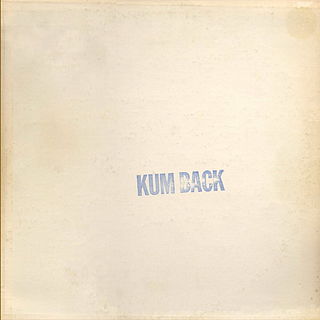
Kum Back is the first bootleg album by the Beatles, released in January 1970. The album is an early version of what would become Let It Be, sourced from a tape recording of an acetate prepared by the band's engineer, Glyn Johns. It is one of the earliest commercial rock bootlegs, the first being Great White Wonder by Bob Dylan which was released several months earlier.
"Hello Little Girl" is one of the first songs written by John Lennon, credited to the Lennon–McCartney songwriting partnership. Written in 1957, it was used as one of the songs at the Beatles unsuccessful Decca audition in 1962, included on the 1995 compilation album Anthology 1. A 1960 home demo recording has never been officially released.
"Hallelujah I Love Her So" is a single by American musician Ray Charles. The rhythm and blues song was written and released by Charles in 1956 on the Atlantic label, and in 1957 it was included on his self-titled debut LP, also released on Atlantic. The song peaked at number five on the Billboard R&B chart. It is loosely based on 'Get It Over Baby' by Ike Turner (1953).

Get Back – Together is the second album by the reformed Liverpool band the Quarrymen, which was the band that, in its original conception, evolved into the Beatles. It is also the first of two albums by the band that feature all surviving founding members together, as while the name the Quarrymen name was used in the 1994 album Open for Engagements seen as the first album since the reformation, it only featured Rod Davis and part-time member John Duff Lowe. Eric Griffiths and Len Garry make their first appearances on a studio recording with drummer Colin Hanton also returning to the band for the first time since 1959, having previously appeared on the "In Spite of All The Danger" recording in 1958 as a b-side to a cover of Buddy Hollys "That'll Be the Day". It is also the only full length album featuring Pete Shotton who also returned to the band in 1997 but later retired due to ill health. Shotton subsequently died in 2017.

Phillips' Sound Recording Services was a studio in the house of Percy Francis Phillips (1896–1984) and his family at 38 Kensington, Kensington, Liverpool, England. Between 1955 and 1969, Phillips recorded numerous tapes and acetate discs for Liverpool acts, people and businesses in a small room behind the shop his family owned.













